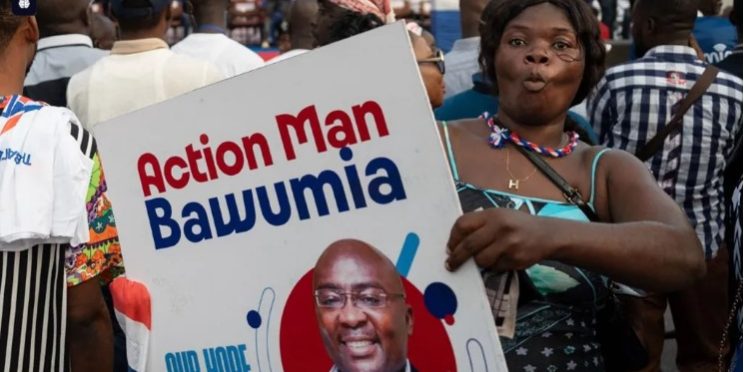From political outsider to Ghana's 'Mr Digital'
Monday, 25 November 2024 | Ghana

Mahamudu Bawumia soared from being a political outsider to become Ghana's second-in-command - and in December he could make history as the country's first Muslim president.
Bawumia, currently Ghana's vice-president, was chosen by the governing New Patriotic Party (NPP) as their candidate for the forthcoming general election.
The 61-year-old Tottenham Hotspur supporter has quite the reputation.
He is an intellectual educated at Oxford University, is never seen without his signature slim, rectangular glasses and has been dubbed "Mr Digital" thanks to his pledge to whip Ghana into a technological heavyweight.
But because he is head of the government's economic management team, many Ghanaians associate Bawumia with the punishing cost of living crisis they're experiencing.
Should Bawumia overcome the criticism and win the election, he will replace his current boss President Nana Akufo-Addo, who is approaching the end of his two-term limit.
"Mr Digital" barrelled onto the political scene in 2008, sparking bemusement and scepticism.
Bawumia was a 44-year-old who had never held public office, yet Akufo-Addo - then a mere presidential candidate - had chosen him as a running mate.
Bawumia's father Alhaji Mumuni had served in Ghana's earliest governments after the country gained independence from Britain in 1957, working closely with revered Prime Minister Kwame Nkrumah.
But the younger Bawumia had forged a career in economics and banking - serving as the deputy governor of Ghana's central bank.
To many commentators and NPP insiders, it made no sense for Akufo-Addo to pick Bawumia over seasoned party members.
Akufo-Addo ended up losing the election to John Atta Mills from the National Democratic Congress (NDC) by a tiny margin.
Bawumia lost out on the VP job - but his charismatic campaign had silenced the naysayers.
"He fired [up] the NPP campaign. I think no-one else could have done a better job, to be honest, in terms of the support he gave to the NPP," Ghanaian political scientist Dr Clement Sefa-Nyarko told the BBC.
Akufo-Addo and Bawumia gave the elections another go in 2012. Again, they lost.
The NPP challenged the election results in the Supreme Court, choosing Bawumia as their star witness.
During the proceedings, which were broadcast on national television, Bawumia came across as witty and unflustered by the relentless, days-long cross-examination.
“People were like, who is this guy? He's really the guy to root for," said Dr Sefa-Nyarko, who lectures on African leadership at King's College London.
Akufo-Addo decided to keep Bawumia on his ticket and in 2016, on their third shot at power, the NPP won with 51.3% of the vote. Bawumia finally became vice-president.
Bawumia's journey to the top began in 1963, when he was born into a large family in the northern city of Tamale.
He was the 12th of his father's 18 children.
Bawumia, currently Ghana's vice-president, was chosen by the governing New Patriotic Party (NPP) as their candidate for the forthcoming general election.
The 61-year-old Tottenham Hotspur supporter has quite the reputation.
He is an intellectual educated at Oxford University, is never seen without his signature slim, rectangular glasses and has been dubbed "Mr Digital" thanks to his pledge to whip Ghana into a technological heavyweight.
But because he is head of the government's economic management team, many Ghanaians associate Bawumia with the punishing cost of living crisis they're experiencing.
Should Bawumia overcome the criticism and win the election, he will replace his current boss President Nana Akufo-Addo, who is approaching the end of his two-term limit.
"Mr Digital" barrelled onto the political scene in 2008, sparking bemusement and scepticism.
Bawumia was a 44-year-old who had never held public office, yet Akufo-Addo - then a mere presidential candidate - had chosen him as a running mate.
Bawumia's father Alhaji Mumuni had served in Ghana's earliest governments after the country gained independence from Britain in 1957, working closely with revered Prime Minister Kwame Nkrumah.
But the younger Bawumia had forged a career in economics and banking - serving as the deputy governor of Ghana's central bank.
To many commentators and NPP insiders, it made no sense for Akufo-Addo to pick Bawumia over seasoned party members.
Akufo-Addo ended up losing the election to John Atta Mills from the National Democratic Congress (NDC) by a tiny margin.
Bawumia lost out on the VP job - but his charismatic campaign had silenced the naysayers.
"He fired [up] the NPP campaign. I think no-one else could have done a better job, to be honest, in terms of the support he gave to the NPP," Ghanaian political scientist Dr Clement Sefa-Nyarko told the BBC.
Akufo-Addo and Bawumia gave the elections another go in 2012. Again, they lost.
The NPP challenged the election results in the Supreme Court, choosing Bawumia as their star witness.
During the proceedings, which were broadcast on national television, Bawumia came across as witty and unflustered by the relentless, days-long cross-examination.
“People were like, who is this guy? He's really the guy to root for," said Dr Sefa-Nyarko, who lectures on African leadership at King's College London.
Akufo-Addo decided to keep Bawumia on his ticket and in 2016, on their third shot at power, the NPP won with 51.3% of the vote. Bawumia finally became vice-president.
Bawumia's journey to the top began in 1963, when he was born into a large family in the northern city of Tamale.
He was the 12th of his father's 18 children.
- 2024Elections | BBC News | Dr_ Bawumia | Ghana | Ghana Decides | NPP


 How to resolve AdBlock issue?
How to resolve AdBlock issue?